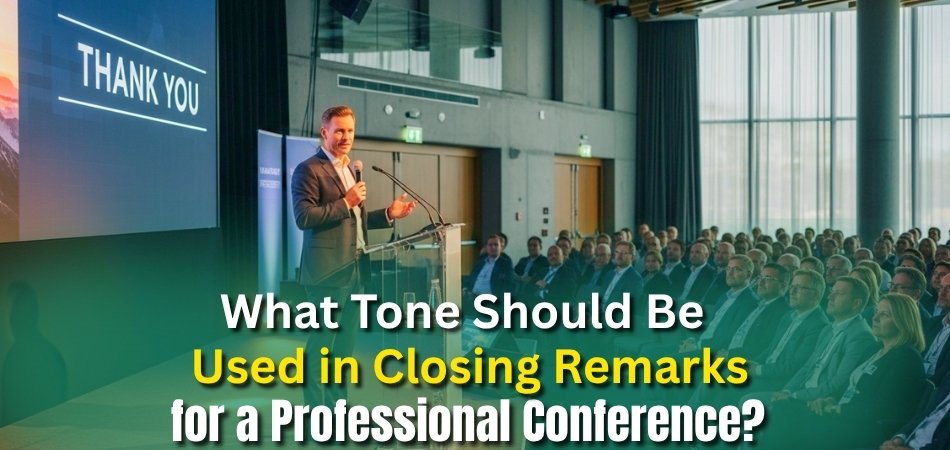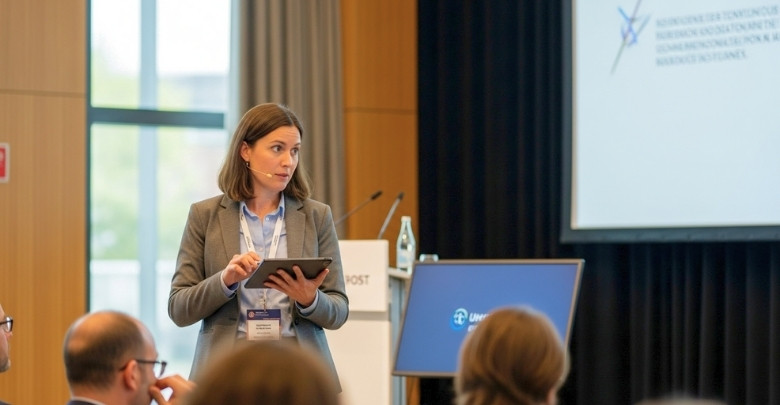Every conference ends with a moment that defines how the entire event will be remembered: the closing remarks. They are more than just a formality; they carry emotion, appreciation, and purpose. When delivered with the right tone, they inspire audiences and strengthen the event’s lasting impact.
So, what tone should be used in closing remarks for a professional conference? The best tone blends professionalism with warmth and sincerity. It should express gratitude, celebrate collaboration, and motivate participants to take what they’ve learned beyond the event. A thoughtful tone keeps the audience engaged even after the session ends.
The right tone connects hearts and minds, leaving participants with motivation and appreciation. It turns a simple farewell into a memorable conclusion. Keep reading to explore how to craft the perfect tone for your next professional conference.
What Tone Should Be Used in Closing Remarks for a Professional Conference?
The tone used in closing remarks for a professional conference should reflect respect, gratitude, and inspiration. It helps summarize the event’s purpose and leaves attendees with a strong final impression. A thoughtful tone unites the audience’s experience and reinforces the conference’s message with warmth and professionalism. A clear understanding of tone helps speakers deliver a meaningful and memorable conclusion. Let’s look at the key reasons why tone plays such an important role in professional closing remarks.
Reinforces Professionalism
A professional tone conveys credibility, leadership, and respect for everyone involved in the event. It assures attendees that the conference was conducted with structure and integrity. When organizers maintain a composed and polished tone, they project confidence that matches the event’s importance, similar to what is expected in upcoming conferences in Canada, the USA and beyond.
Leaves a Positive Impression
The final words of a conference should leave participants feeling fulfilled and motivated. A positive tone ensures the event ends on an uplifting note, helping attendees remember it as valuable and inspiring. When closing remarks express confidence and optimism, they strengthen the conference’s overall message and encourage future engagement with similar professional gatherings.
Builds Connection With the Audience
A warm, inclusive tone builds a bridge between speakers and attendees, fostering a sense of shared achievement. When speakers address the audience with sincerity and appreciation, it transforms a formal conclusion into a genuine exchange. This emotional connection deepens audience satisfaction and strengthens professional relationships that often extend beyond the conference setting.
Expresses Gratitude and Acknowledgment
Gratitude reinforces appreciation for every effort that made the event successful. Mentioning speakers, participants, sponsors, and organizers in a gracious tone highlights teamwork and dedication. Expressing thanks sincerely helps close the event on a harmonious note, reminding everyone that their contributions mattered and that the success was truly a collective accomplishment.
The right tone in closing remarks determines how the event will be remembered. By balancing professionalism with emotion and gratitude, speakers ensure their message resonates deeply. A well-crafted tone leaves a final impression of respect, inspiration, and unity, setting the stage for continued collaboration and future conference participation.
Balancing Professionalism with Warmth and Gratitude
Striking the right balance between professionalism and warmth ensures closing remarks sound both respectful and heartfelt. It helps maintain the event’s formal tone while still making attendees feel valued and appreciated. A speaker who masters this balance projects confidence, empathy, and leadership, leaving the audience with a sense of genuine connection and purpose.
This section explains how to maintain that harmony through thoughtful word choice, gratitude, and tone control to make closing remarks meaningful and memorable.
Show Respect Through Word Choice
Every word should reflect courtesy and professionalism. Choosing clear, respectful language communicates confidence and attentiveness to the audience. Avoid slang or overly casual expressions that might reduce the event’s seriousness. Phrases like “We deeply appreciate your time and participation” demonstrate respect while maintaining a polished, professional tone suitable for formal conference settings.
Express Gratitude Naturally
Gratitude should feel sincere, not rehearsed. Thanking attendees, speakers, and organizers shows that their contributions are recognized and valued. When you express appreciation with authenticity, it strengthens relationships and reinforces a sense of collaboration. Example: “We appreciate the dedication each participant has shown throughout this event. Your energy and insights made today truly impactful.”
Avoid Being Too Formal or Robotic
An overly stiff tone can distance the speaker from the audience. Balance is achieved by blending formality with approachability. Using natural expressions and a conversational rhythm keeps the message engaging while maintaining respect. Let your appreciation sound human and heartfelt, avoiding mechanical phrasing that might make your message feel impersonal or detached.
Balancing professionalism with warmth ensures that your closing remarks leave a respectful yet memorable impression. By speaking with sincerity and composure, you connect emotionally without losing credibility. The right tone transforms closing words into a lasting reflection of appreciation, motivating attendees to remember the event positively and look forward to future conferences.
Adapting the Tone to Match the Event and Audience
Every conference has its own atmosphere and participant expectations, so the tone of your closing remarks should align with the nature of the event. Adapting your tone thoughtfully allows your remarks to feel natural to the audience while maintaining clarity and purpose. Let’s explore how to tailor your tone effectively for different types of conferences.
Academic Conferences: Informative and Factual
In academic settings, the tone should reflect objectivity and respect for scholarly work. Keep your language precise and free of exaggeration. Focus on summarizing key insights rather than emotional appeals. Example phrase: “Your research contributions have enriched our discussions today and strengthened the academic dialogue we aim to promote.”
Business Conferences: Motivational and Collaborative
Corporate audiences respond well to energy and encouragement. The tone here should be confident, goal-oriented, and unifying. Encourage future collaboration and emphasize shared purpose. Example phrase: “Let’s transform today’s ideas into tomorrow’s achievements and continue driving innovation together beyond this event.”
Creative Conferences: Inspiring and Informal
Creative gatherings invite a more expressive and relaxed tone. Speak with enthusiasm and imagination to match the creative energy of participants. Avoid rigid formality and focus on inspiration. Example phrase: “Keep creating, sharing, and inspiring beyond this room. Your creativity is what drives change in every field represented here.”
Considering Audience Diversity
Every audience includes people of varied cultural, linguistic, and professional backgrounds. Be mindful of inclusive language that avoids jargon or culturally specific humor. Respect differences in communication styles and ensure your tone feels welcoming to everyone present, regardless of their role or background.
Tone Adaptation Guide Template
| Event Type | Recommended Tone | Example Closing Line |
| Academic | Objective and Respectful | “Your research contributions have enriched our discussions today.” |
| Business | Motivational | “Let’s transform today’s ideas into tomorrow’s achievements.” |
| Creative | Friendly and Inspirational | “Keep creating, sharing, and inspiring beyond this room.” |
Adapting the tone to suit the event and audience demonstrates sensitivity, awareness, and professionalism. When speakers adjust their tone to match the occasion, they strengthen engagement and connection. This approach ensures the closing message resonates equally with all participants, helping them leave the conference feeling valued, inspired, and understood.
How to Reflect on Key Highlights Without Sounding Repetitive?
Effective closing remarks summarize the event meaningfully without repeating every session or speech. The goal is to highlight memorable moments that capture the essence of the conference. Instead of re-listing details, focus on reflecting on key outcomes and shared experiences that demonstrate the value of the event to all participants.
This approach allows your message to feel fresh and insightful while maintaining the audience’s interest until the very end. Let’s look at ways to reflect on highlights clearly and engagingly.
Focus on the Core Achievements
Identify two or three main accomplishments that define the success of the conference. These may include breakthrough discussions, impactful presentations, or collaborative moments. Use concise language that conveys progress and purpose, such as “We’ve advanced conversations that will shape the next phase of our shared goals.”
Highlight Memorable Sessions or Insights
Choose sessions or speakers that truly stood out and represent the event’s central theme. Mention them briefly to remind attendees of their value. Phrases like “One of today’s most inspiring insights came from our panel on innovation and sustainability” help maintain engagement while reinforcing the conference’s purpose.
Reflect, Don’t Repeat
Reflection adds perspective rather than repetition. Summarize what participants gained and how it connects to the event’s broader vision. Use transitional phrases such as “As we reflect on today’s insights” or “One major takeaway is the importance of collaboration in driving meaningful progress.” This keeps the tone thoughtful and forward-looking.
Example of Concise Reflection
“Throughout these sessions, we explored practical solutions and innovative ideas that align with our shared mission. One standout takeaway was the importance of collective effort in achieving lasting results, reminding us how collaboration turns vision into action.”
Reflecting on highlights should always feel purposeful and inspiring. Instead of recapping every point, focus on what truly mattered and how it contributed to the event’s success. By summarizing with perspective and gratitude, your closing remarks become impactful, encouraging attendees to carry the conference’s spirit and insights into their future endeavors.
Common Tone Mistakes to Avoid in Professional Conferences
Even experienced speakers can unintentionally choose the wrong tone when delivering closing remarks. A single misstep can affect how the entire event is remembered. Understanding common tone mistakes helps maintain professionalism and ensures that your final words reflect confidence, respect, and appreciation for every participant’s contribution.
By recognizing these errors, speakers can refine their delivery and leave a positive impression that aligns with the event’s objectives.
Being Overly Casual or Humorous
While humor can ease tension, overusing it may reduce the event’s credibility. When adding humor in conference closing remarks, it’s important to stay subtle and relevant to the occasion. Avoid jokes or comments that sound unprofessional or unrelated to the topic. The closing moment should reinforce respect and gratitude rather than create unnecessary levity that distracts from the purpose of the conference.
Ending Abruptly or Without Acknowledgment
Finishing too suddenly or forgetting to thank key contributors leaves the audience feeling unrecognized. Always include appreciation for speakers, sponsors, and attendees. A thoughtful acknowledgment demonstrates professionalism and ensures the audience feels valued for their role in the event’s success.
Sounding Promotional Instead of Appreciative
Using closing remarks to promote a brand, product, or upcoming event can seem self-centered. The focus should remain on appreciation and reflection, not advertisement. Audiences respond best when they sense authenticity, so emphasize gratitude and shared achievement rather than personal or organizational promotion.
Using Filler or Uncertain Language
Phrases like “I guess that’s all” or “Well, I think we’re done” weaken your authority. Such uncertainty reduces the impact of your closing. Replace them with clear and confident expressions such as “Thank you for making this event truly meaningful” or “Let’s carry this momentum forward together.”
Ignoring Tone Consistency Throughout
Your tone should remain professional from the first word to the last. Switching from formal to overly casual or emotional near the end can confuse the audience. Maintain composure and consistency to reflect steadiness, reliability, and respect for everyone involved in the conference.
Avoiding these tone-related mistakes ensures your closing remarks convey professionalism and sincerity. Consistency, clarity, and appreciation make your final words memorable for the right reasons. By ending with purpose and composure, you strengthen the audience’s trust and reinforce the overall success of the event.
How to Leave a Lasting Impression with the Right Words?
The final moments of a conference speech hold the power to shape how the event will be remembered. Choosing the right words allows speakers to inspire, motivate, and leave a sense of accomplishment among attendees. Let’s explore how to craft closing words that leave a meaningful impression.
Inspire with Optimistic Language
Your closing lines should uplift and motivate the audience. Use words that emphasize progress, collaboration, and shared vision. A tone of encouragement reminds attendees of the purpose that brought them together. Example: “Let’s continue building on today’s ideas to create a lasting impact in our fields.”
Emphasize Hope and Future Possibilities
Conclude with a message that looks ahead rather than reflecting only on the past. A forward-focused tone promotes enthusiasm for upcoming projects or events. Example: “Your presence has made this conference not just successful but meaningful. Let’s use this energy to drive future innovations together.”
Connect Emotionally Through Sincerity
Emotionally resonant language helps you connect deeply with the audience. Speak from genuine appreciation and pride in collective achievement. Example: “Every discussion today reminded us how powerful shared purpose can be. Together, we’ve built connections that will extend far beyond this event.”
Final Closing Remark Example Template
| Purpose | Example Closing Line |
| Motivational | “Let’s continue building on today’s ideas to create a lasting impact.” |
| Appreciative | “Your presence has made this conference not just successful but meaningful.” |
| Reflective | “May the insights gained here inspire us to move forward with clarity and confidence.” |
The last words of your speech are more than a formality; they are the emotional seal of the entire event. When writing professional conference closing remarks, focusing on gratitude, clarity, and optimism helps your message feel genuine and lasting. By ending with gratitude, optimism, and sincerity, you ensure the audience leaves inspired and connected to your message.
Frequently Asked Questions
Here are some common questions people often ask after learning how to craft closing remarks for a professional conference. These answers will help you refine your approach and deliver impactful conclusions that truly connect with your audience.
How Long Should Closing Remarks Usually Be?
Closing remarks should generally last between three to five minutes. This time allows you to thank contributors, reflect on key moments, and end with inspiration without losing audience attention. Keep your message clear, warm, and meaningful throughout.
Should I Write My Closing Remarks in Advance?
Yes, preparing your closing remarks in advance helps you stay confident and organized. It also prevents filler words and awkward pauses. Practice your delivery so the tone feels natural, and adjust your language to fit the conference type.
Can I Use Quotes in My Closing Remarks?
Absolutely. A relevant quote can strengthen your message and leave a lasting impression. Choose quotes that match the conference’s theme or purpose. Keep them short, inspiring, and easy for the audience to remember after the event ends.
How Can I Keep My Closing Remarks Engaging?
Focus on energy, connection, and authenticity. Use varied sentence tones and maintain eye contact to engage your audience. Include one memorable story or key takeaway that captures the essence of the event and inspires reflection.
Is It Okay to Include Humor in My Closing Speech?
Yes, light humor works well if it suits the audience and setting. Keep it respectful, simple, and relevant to the event. Avoid jokes that could sound unprofessional or misunderstood by diverse participants.
What Should I Do If I Feel Nervous While Delivering Closing Remarks?
Take a deep breath and slow down your speech. Remember that the audience is supportive and wants you to succeed. Focusing on gratitude rather than performance often helps reduce tension and creates a more genuine tone.
How Do I End My Closing Remarks Powerfully?
Finish with a hopeful or action-oriented line. Summarize your message and encourage continued collaboration or learning. For example, “Let’s carry today’s lessons forward and make a real difference together.” This approach leaves a strong, lasting impression.
Concluding Lines
A powerful conclusion can leave a lasting mark on every attendee’s mind. Closing remarks are not just about saying goodbye; they express gratitude, highlight achievements, and motivate participants to continue the conversation beyond the event. The right tone makes this moment truly memorable.
When deciding what tone should be used in closing remarks for a professional conference, focus on being respectful, appreciative, and inspiring. It should reflect professionalism while still feeling warm and genuine. This balance helps end the event on a positive and meaningful note.
A well-chosen tone connects the audience emotionally and reinforces the event’s purpose. It ensures everyone leaves with appreciation and enthusiasm for what comes next. End confidently, speak from the heart, and let your final words carry the spirit of the entire conference forward.








